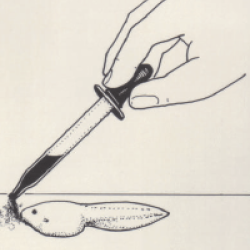Source Institutions
Source Institutions
Add to list Go to activity
Activity link broken? See if it's at the internet archive

In this activity and/or field trip, learners investigate the water currents that aquatic animals create when they breathe, feed, and propel themselves through water. Learners trace the currents in water using diluted food coloring, and closely observe live animals' adaptations for aquatic survival. Learners also consider questions like how does pollution affect water breathers, and how does water breathers' movement affect their environment. Educators can collect live aquatic animals in advance of the activity, or learners can help collect animals as part of a field trip.
- 30 to 45 minutes
- $10 - $20 per group of students
- Ages 8 - 18
- Activity, Experiment/Lab Activity, Field Trip
- English
Quick Guide
Materials List (per group of students)
- medicine droppers
- small containers of diluted food coloring
- observation trays
- large dip nets
- bottle of blue or green food coloring
- 1 or 2 large buckets or dishpans to hold animals
- 2 small nets or cups to transfer animals
- waterproof marking pens
Subjects
-
Life Sciences
-
Diversity of Life
- Animals
-
Ecology
- Human Impact
-
Diversity of Life
Informal Categories
- Animals
- Nature and Environment
- Outdoor Activity
Audience
To use this activity, learners need to:
- see
- see color
- touch
Learning styles supported:
- Involves teamwork and communication skills
- Involves hands-on or lab activities
Other
This resource is part of:
Access Rights:
- Free access
By:
Rights:
- All rights reserved, The Regents of the University of California, 1979
